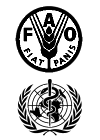
Committee and Task Force Meetings
Meetings
The meetings of the Committees play an essential role in the Codex process of standard setting. As already noted, a Committee is assigned to the task of developing draft proposals for new or updates standards. The topics of these drafts depends of course on the Committee's subject: the CCCF is responsible for establishing and endorsing maximum levels for contaminants and naturally occurring toxicants in food and feed, whereas the CCFO is there to elaborate worldwide standards for fats and oils of animal, vegetable and marine origin. Look for the Terms of Reference of the committee of interest to see which subjects are assigned to it.
The proposals are discussed in a meeting, where representatives of the Codex Members and Observers meet. This meetings follows an Agenda that is drafted by the Committees chair and the Codex Secretariat, and published on forehand for everyone to see. A meeting covers usually a consecutive period of four or five days (e.g. Monday up to Friday). In these days the participants discuss the proposals that were developed by an Working Group of Members and Observers, and send to the people some time before (usually a few months). The discussions are done in a plenary room and controlled by the Chair who is sitting before the participants at the chairs table. Next to the Chair, this table can be seated by a vice-chair or a chair's assistant, and by representatives of the WHO and FAO and of the Codex Secretariat. After finalizing the agenda the chairs table will spend some time writing a draft report of the meeting. This report is discussed at the last day in plenary, and is to be accepted by the meeting (on consensus). The Report is then published on the Codex website in the Codex languages, public for everybody, and send to the CAC for final adoption.
Dates and places of the meetings
As there are many Committees and Task Forces, the meeting agenda plays a relevant role in the Codex Alimentarius activities. Most committees have their meeting once a year, but others decided to limit it to once per one-and-a-half or two years. People should be able to join each committee meeting, so meetings can only be planned at unique dates. The meetings schedule is to be published a year before, so that participants can adjust their agenda accordingly.
Besides of the meeting period, the list shows at which location the meeting will take place. Some Committees have a fixed location, and meet always in the same room. Other hosts however organize their meetings in their country alternating in different places, or even sometimes in another country. The latter situation refers to "co-hosting", where the host country can select a (preferably: developing) country for a meeting.
